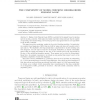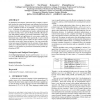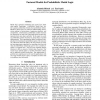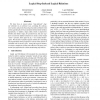607 search results - page 29 / 122 » Axiomatizing hybrid logic using modal logic |
LMCS
2007
14 years 11 months ago
2007
Higher-Order Fixpoint Logic (HFL) is a hybrid of the simply typed λ-calculus and the modal µ-calculus. This makes it a highly expressive temporal logic that is capable of express...
103
click to vote
CCS
2010
ACM
15 years 6 months ago
2010
ACM
In distributed environments, statements from a number of principals, besides the central trusted party, may influence the derivations of authorization decisions. However, existin...
AAAI
2008
15 years 2 months ago
2008
Modal logic represents knowledge that agents have about other agents' knowledge. Probabilistic modal logic further captures probabilistic beliefs about probabilistic beliefs....
AMAI
2004
Springer
15 years 5 months ago
2004
Springer
The framework of algorithmic knowledge assumes that agents use algorithms to compute the facts they explicitly know. In many cases of interest, a logical theory, rather than a par...
LICS
2009
IEEE
15 years 6 months ago
2009
IEEE
We show how to reason about “step-indexed” logitions in an abstract way, avoiding the tedious, error-prone, and proof-obscuring step-index arithmetic that seems superficially...




